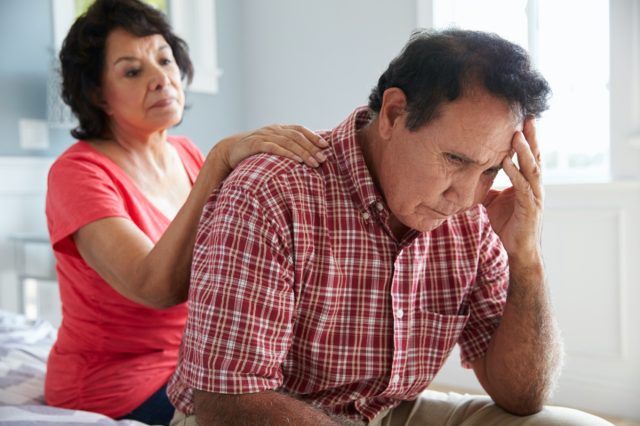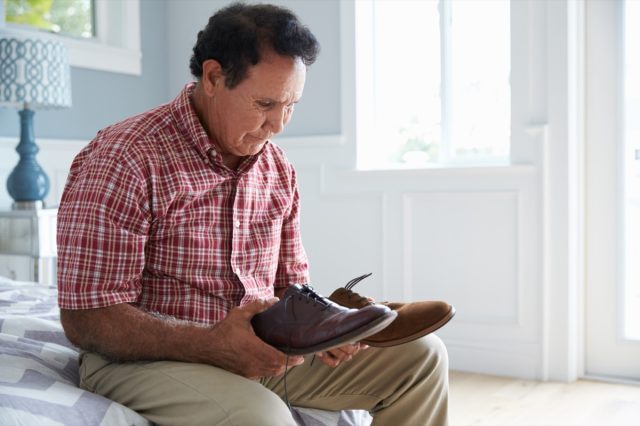An estimated 5.8 million Americans live with Alzheimer’s, “a progressive disease beginning with mild memory loss and possibly leading to loss of the ability to carry on a conversation and respond to the environment,” according to the Centers for Disease Control and Prevention. Although Alzheimer’s commonly affects the older community, the disease can start in a person’s 30s. To get a better understanding of Alzheimer’s, Eat This, Not That! Health spoke with experts who explained when signs of the disease typically begin and who is at risk for Alzheimer’s. Read on—and to ensure your health and the health of others, don’t miss these Sure Signs You’ve Already Had COVID.
Shutterstock
dr Elise EifertAssistant Professor, Gerontology Program, UNC Greensboro explains, “It can be difficult to say when people with Alzheimer’s disease and related dementia realize that something has changed. Early symptoms can be vague and vary between people. While some people pick up on changes in their own thinking or behavior, sometimes these signs are first noticed by those closest to them. In later stages, many people experience anosognosia or lack of awareness that there are any deficits. The decline in mental function essentially affects one’s ability to understand and acknowledge the extent of one’s impairment.”
dr Sam Zand, psychiatrist and the Chief Medical Officer of Better U adds, “Usually screened for above 65 years old, there can be early onset in someone’s 50’s and even 40’s.”
 Shutterstock
Shutterstock
dr Verna R Porter, MD, neurologist and director of the Dementia, Alzheimer’s Disease and Neurocognitive Disorders at Providence Saint John’s Health Center in Santa Monica, CA, says signs of Alzheimer’s include, “the progressive loss of working and long-term memory, confusion and disorientation, changes in fluency with regard to speech or writing, lowered ability to concentrate, compromised judgment and reasoning leading to questionable decision making, and changes in mood such as apathy, anxiety and depression which can result in social withdrawal. Depression, if left untreated, can exacerbate confusion and forgetfulness.”
 Shutterstock
Shutterstock
According to Dr. Porter, “Normal, age-related memory changes are very different from memory loss experienced from forms of dementia, such as with Alzheimer’s disease. In normal aging, forgetfulness does not interfere with the ability to carry on with normal daily activities and is not necessarily Examples of common memory complaints that may occasionally occur during normal aging include misplacing objects around the house, forgetting the names of less familiar acquaintances, forgetting one’s intent upon entering a room, or having some difficulty remembering lesser details of what you have read or of prior conversations.”
RELATED: If You Have a Heart Problem, You May Need These Specialists ASAP
 Shutterstock / Robert Kneschke
Shutterstock / Robert Kneschke
dr Zand says the elderly art at most risk. Age is the biggest risk factor as the brain atrophies over time. Cellular strength weakens and metabolic processes slow down with age. Those with poor mental stimulation. As the old adage says, if you don’t use it, you lose it. This is true with neural health as well. Those with uncontrolled medical issues. Poor brain health is usually caused by the same things that cause poor heart health. Hypertension, diabetes, smoking, unhealthy diet, and lack of exercise can all speed up the dementia process.”
RELATED: Sure Signs You’re Getting Omicron Now
 Shutterstock
Shutterstock
dr Zand states, “Stimulate your mind. Read more, find creative outlets, or learn a new hobby. Engage in stimulating conversations and pursue interests. Eat well. Anti inflammatory foods and low amounts of natural, healthy fats can improve brain health.”
RELATED: #1 Sign You Have One of the “Most Deadly” Cancers
 Shutterstock
Shutterstock
“Globally, 50 million people are estimated to suffer from dementia; 70% of these cases are caused by Alzheimer’s disease, making it the most common neurodegenerative disorder that causes dementia,” says Dr. Porter. “The terms dementia and Alzheimer’s are distinct from each other, in that dementia is a general term that describes symptoms resulting from mental decline that are severe enough to interfere with normal everyday activities and functioning; in contrast, Alzheimer’s disease is a condition that causes dementia .” And to protect your life and the lives of others, don’t visit any of these 35 Places You’re Most Likely to Catch COVID.


Comments are closed.